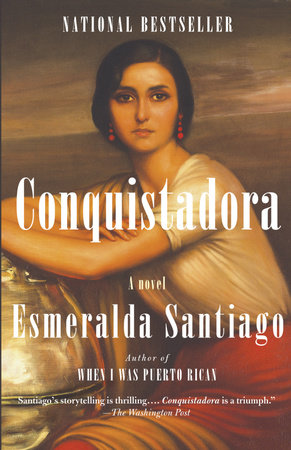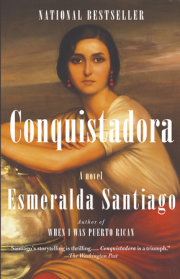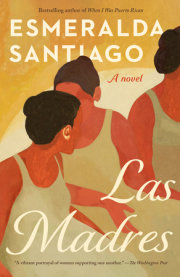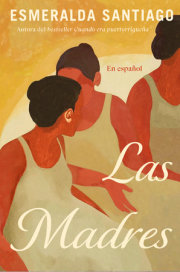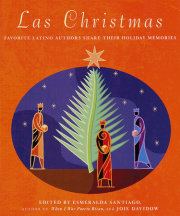“Her Small Person” The horizon was smudged, like a bruise, but as the
Antares approached land, a veiled green pyramid emerged from the haze. Ana grabbed Ramón’s arm and bounced on her toes, unable to contain her excitement.
“Is that it?”
Ramón wove her left hand through his elbow, and brought her gloved fingers to his lips. “We’ll soon be inside the harbor.”
“You can make out San Felipe del Morro.” Inocente pointed to a mustard-colored headland over the frothing surf.
“It’s huge!”
“Impregnable,” Inocente added. “Spanish military engineering at its best.”
Other passengers pushed closer to the rail, craned their necks, adjusted their hats and bonnets to shade their eyes from the blinding sun. Crewmen hopped around the deck in a dance of sail lowering, rope loosening, latch securing, and the tying down of canvas-wrapped bundles. As the vessel glided through the protected passage into the broad harbor, Ana’s breath quickened. This is it, she thought, Puerto Rico. A sense of déjà vu made her dizzy.
“Now I know what my ancestors must have felt,” she said, “seeing land after weeks at sea. . . .”
“Let’s hope we have the luck of those who became rich and not the luck of those eaten by the Caribs,” muttered Inocente.
Ramón and Ana laughed. Some passengers standing nearby glanced at them nervously and gave them a bit more room. The brothers exchanged an amused look over Ana’s head. She put her other arm through Inocente’s so that they were linked to each other through her. She sighed happily as the walled city came into view.
“At last,” she said softly. “We’re here at last.”
She closed her eyes and mentally etched the date into memory: Wednesday, October 16, 1844.
It was early morning, and the harbor was thick with two- and three-masted schooners, barges, sloops, and fishing boats vying for lanes, most of them flying the red-and-gold Spanish flag. San Juan rose from the waterfront behind the thick walls that protected it from invasions and enemy attacks from the Atlantic Ocean. Wide swatches of green peppered the hill, gardens, or pastures—Ana couldn’t tell—but closely packed buildings intersected by roads and alleys defined most of the land. Several towers topped by crucifixes were scattered across the citadel, their bells echoing over the water. To Ana, San Juan looked like Cádiz, the city they’d left three thousand miles behind in Spain.
She freed her arms from Ramón and Inocente and turned to where verdant hills stretched east to west, the vegetation nearly unbroken by man-made structures. Low white clouds formed over the green, blackening the land below. She turned again to the light and sunny city. As the schooner approached the dock, passengers oohed and aahed at the painted houses, the balconies adorned with flowers and foliage on the upper stories. On the fl at roofs, women’s skirts and fringed shawls fl uttered in the breeze in a panoply of color and movement. Some of them waved, and passengers returned their greetings. Other women dressed in black stood as immobile as the sentry boxes over the rock walls of the fort. They were too far from shore for Ana to distinguish features, but so many women in mourning over the gay city palled her humor. She threaded her arms again through Ramón’s, then Inocente’s, arm and pulled them closer, focusing their attention on the movement on the wharf, away from the widows.
“There he is!” Ramón pointed at don Eugenio standing by an open carriage near the dock, amid the bustle and hubbub around the waterfront. Next to him stood a younger man, somewhat taller, powerfully built, his face shaded by a wide-brimmed straw hat. Eugenio waved when he spotted them, nodded at the younger man, and walked toward the wharf.
The dock was narrower than Ana expected, the boards slippery, set wide apart, and she worried her foot might get caught between them. Crowds made her nervous because she was so short that she couldn’t see over people’s heads or around the wide feminine silhouette that was the fashion of the day. Ramón and Inocente formed a barrier between her and the multitude. They steered her to avoid women’s skirts, a man carrying a heavy valise, an old man being led by a much younger woman. Five impeccably dressed children walked slowly hand in hand, taking up the width of the dock, while behind them, a toddler screeched at the top of his lungs in spite of his nurse’s efforts to comfort him. After the fresh ocean breeze on the open seas, the waterfront smelled of dead fish and pine tar, of sweat, urine, rotting wood. Ana was faint.
“Almost there,” Ramón said as he led her forward. She finally stepped on solid ground.
“
Bienvenidos, welcome!” don Eugenio said, kissing Ana on both cheeks. His whiskers were damp. “What a joy to have you near again!”
While he hugged and kissed his sons, she discreetly wiped the moisture from her cheeks with the back of her glove. From the corner of her eye she caught the bemused smile of the man don Eugenio had been talking to. She turned her back on him.
“This way. Your trunks will be delivered to the house.”
Don Eugenio helped her into the open carriage, and Ramón climbed in beside her. Inocente and don Eugenio took the facing seats. The driver, a round-faced man with the blackest skin Ana had ever seen, sat on one of the two horses, clucked his tongue, tugged and loosened the reins as he skillfully guided them through the crowd. As Ana opened her parasol, she noticed that the man who smiled at her was still standing in the same spot. He lifted his hand in a wave, and she wondered that he’d be so brazen, but then realized he was waving at don Eugenio, who acknowledged him with a nod.
“Who is that?” asked Inocente.
“His name is Severo Fuentes. He worked for Rodrigo and has been recommended as manager for the plantation. You’ll meet him later.”
Ana wanted to get a better look, but when she turned around, he’d vanished.
The street was so congested that they made little progress and beggars took advantage.
“Por favor, señora, una limosna,” implored a boy whose left arm ended in a stump just above the wrist.
“Por amor a Dios,” begged another, his narrow face peeling in strips as thin and transparent as discarded snakeskin.
On the other side of the carriage a woman pressed along, silently, hands cupped, huge eyes imploring.
Don Eugenio scattered them with his walking stick, but they followed, clamoring, while Ramón, Inocente, and Ana tried to ignore them. It was impossible, however. There were so many, and so persistent.
Ana reached into her reticule, and thinking she was about to hand out alms, the beggars changed their outcries.
“Que Dios la bendiga, señora,” they blessed her.
“Que la Santísima Virgen se lo pague, señora.” Their grateful voices brought more pleas and outstretched hands, bringing the carriage to a stop.
“If you give to one, they won’t leave us alone,” Inocente warned.
“I know that,” she said irritably. She was born in a city where dodging beggars was a skill learned from childhood. She pulled a handkerchief from the reticule and blotted her cheeks and forehead. The beggars’ cries of disappointment were followed by curses.
“Go away. There’s nothing for you here.” Inocente’s walking stick struck a boy on the chest, another on the shoulders. A small boy tried to climb onto the carriage.
Don Eugenio pushed him off. “Where are you going?”
A mounted soldier pressed his horse through the crowd and, in between curses and threats, moved the beggars along. They didn’t go far, though, just to the carriage behind, already mobbed.
“Everything all right, Colonel?” the soldier asked, saluting don Eugenio.
“Thank you. We’re fine now.” Don Eugenio saluted back. “Just trying to get home.”
The soldier cleared the road in front of them, and soon they entered the gate and were heading uphill. Don Eugenio brushed the sleeves and lapels of his white suit, even though none of the beggars had touched him. “Disgraceful! Something must be done about these people.”
“Every city has beggars, Papá,” said Ramón, “and orphans and lunatics. San Juan wouldn’t be a proper city without them.”
“You might think it’s funny, but your mother and cousin can’t leave the house without being harassed. It’s outrageous.”
“Why are there so many children?” asked Ana.
“No orphanage,” answered don Eugenio, “and for that matter, no lunatic asylum. There’s no place to put them. And the city has grown rapidly. The authorities can’t keep up.”
Don Eugenio continued his harangue, but Ana couldn’t concentrate. She couldn’t bear the hot, humid air. Her clothes were heavy; the seven ruffled petticoats under her fine cambric skirt weighed against her thighs. Her scalp was on fire even under her parasol and bonnet. Droplets of sweat slid down her neck and back, dampening her chemise, soaking into her corset, the stays digging into her ribs.
“Are you all right,
querida?” asked Ramón. “You look flushed.”
“It’s the heat. It will take getting used to.”
“We’ll be home soon,” don Eugenio promised.
She’d never seen such bright sun, nor shadows with such finely defined edges. The contrast between light and dark was so great that her eyes watered and strained, trying to make out the shapes inside buildings and beyond alleys.
Even away from the harbor, pedestrians vied for space with carts, carriages, and soldiers on horseback and on foot, with servants carrying baskets full of produce or stacks of kindling on their heads. Barefoot stevedores in tattered pants and shirts moved sacks and bundles from the wharves into the wooden buildings lining the waterfront and the streets leading to it. In Sevilla there were people from all over the world, but Ana had never seen so many black men, women, and children. And even along the busy waterfronts in Sevilla and Cádiz, human beings didn’t carry such huge loads.
Ana had expected San Juan to be pretty. It was the capital of the island, after all, settled three hundred years earlier. It surprised her that it was so unfinished. The road they were traveling on was deeply rutted. Trenches along one side or the other ran with streams of foul-smelling black water. Ana had read that the government decreed that all houses in San Juan should be masonry, but along the city walls, an amalgam of shacks and
ranchos leaned against one another, most of them built from scraps and roofed with straw or layers of palm fronds. Dogs, pigs, and goats wandered unattended, eating whatever they could scavenge from the mounds of garbage. Hens squawked, flailing their wings into short, ungainly flight to avoid the wheels of slow-moving carriages or the hooves of horses and beasts of burden. The people in the shacks were dressed in tatters, the children naked, the women in thin cotton skirts and blouses cut low on the shoulder, their unkempt hair tied up loosely or wrapped in turbans.
“This section of the city,” don Eugenio said, “is less well maintained, as you can see. Most of the people here are
libertos. They were slaves who fought on the royalist side in the wars for independence in Spanish America, so the government allowed them to find asylum, and liberty, in Puerto Rico.”
“But there are whites here, too,” Ana said. “So they can’t all be
libertos.”
“Doubtless you’ve read that this island was a penal colony for centuries. Some of the men here are
desterrados, exiles who chose not to or couldn’t return to Spain after serving their sentences. Others came here as soldiers and established families. Some,” don Eugenio sighed, “came to make their fortune but were seduced by the bottle, by cards, by fighting cocks.”
As the carriage wheeled west, the dwellings were more what Ana expected: closely set masonry houses two or three stories high with overhanging balconies and terra-cotta roof tiles. Most had businesses on the ground floor with residences upstairs, evidenced by lace curtains waving in the breeze. The only women on the streets were servants and hawkers, most of them dark complexioned.
The higher they climbed, the newer the houses, and the fewer the businesses on the ground floors. Just as they turned the corner from a small plaza, they stopped in front of a solid, new two-story house with carved doors. A painted tile was embedded in the masonry: Calle Paloma 9.
“Here we are.” Don Eugenio helped Ana from the carriage. “Take care, my dear, the stones are slippery.” This street was narrower, paved with cobblestones and raised flagstone sidewalks on either side.
As they entered the foyer, Ana’s eyes adjusted to the dim, cool interior. The hall led to an open courtyard shaded by blooming plants and bushes. A gurgling fountain in the center masked the street sounds. Doña Leonor was waiting at the bottom of a wide set of stairs to the left, and behind her, Elena. When their eyes met, Ana read in them Elena’s happiness and her longing.
A flurry of hugs, kisses, and blessings. A young, barefoot maid appeared to take their hats, gloves, Ana’s parasol, and the men’s walking sticks. Ana noticed Elena’s envious accounting of her fashionable pale green dress and lace pelerine.
“Take this, too,” she said to the maid, slipping the pelerine from her shoulders. She was immediately cooler. “My goodness, is it always this hot here?”
“The end of October marks the beginning of the dry season,” don Eugenio explained. “San Juan is known for its healthful breezes, and it’s unusual for the air to be so still this time of year.”
“It’s a disaster in the countryside,” doña Leonor said, snapping her fan open and leading them upstairs. “We’ve had no rain in weeks. The crops are suffering, and the cattle . . .”
“Come, my dear, no bad news. They’ve just arrived,” don Eugenio chided his wife.
“You’ve grown taller, I’m certain of it,” doña Leonor addressed her two sons as one. “And you, Ana, have filled out a bit. Your face is rounder. It’s most becoming.”
She led them into a parlor with tall louvered doors facing a balcony choked with potted geraniums and gardenias. The louvers were half open to cut down the sun, but fragrance weighted the air, and Ana again was assaulted by too much light, color, perfume, heat. Ramón led her to a chair away from the balcony in the cooler part of the room. She found comfort in the furnishings she recognized from the Argoso home in Cádiz by their heavy, carved wooden backs and armrests, their solid Spanishness.
“Your harp!” Ana exclaimed when she saw it in a corner.
“Yes, isn’t it lovely!” Doña Leonor looked fondly toward the instrument. “It arrived without a scratch, in spite of my fears. You can imagine how much I missed it.”
“She fussed and worried about it more than she worried about me!” Don Eugenio smiled.
Ana noticed that Elena seemed confused about where to place herself, as if the arrival of so many people had thrown off the natural balance. She settled in the chair don Eugenio held for her, next to his own. Elena kept glancing from Ramón to Inocente, bypassing Ana’s gaze between them. Finally, she looked at Ana, blushed, lowered her lids, and pressed her lips together.
“Will you play for us later, Mamá?” Ramón asked.
“Of course, hijo. I’m so happy that we’re together again.” Doña Leonor wiped her eyes. “It’s been a most difficult adjustment—”
“Let’s have some coffee,” don Eugenio interrupted, and Elena jumped to ring for the maid.
“We missed you, too, Mamá.” Ramón held his mother’s hand. “We came as soon as we could.”
“But you’ll be leaving again.” She looked accusingly at Ana.
She avoided her mother-in law’s eyes and sought those of Elena, whose expression was noncommittal. How infuriating she is, Ana thought suddenly, so humble and unassuming. She longed to upset her composure, to reveal the true, passionate Elena.
“We must go to the hacienda, of course,” Inocente said. “But we’ll spend a couple of months with you in San Juan. You must show us the city. I’m sure you’ve already met everyone worth knowing.”
“She’s unstoppable, son,” don Eugenio said. “Your mother and Elena have made many friends. They’re always visiting someone or other.”
“We mostly see to the sick and housebound, don’t we, Elena?”
“There is much charity work.”
“Surely you saw the beggars on your way here.”
The maid entered with an ornate silver tray that Ana remembered from Cádiz. She served with the alert submissiveness of a woman who’d been a servant all her life.
“Would you prefer something cool?” Elena asked softly when Ana hesitated before the offered coffee. Her beautiful blue eyes wouldn’t meet Ana’s.
“Yes,” Ana said. “Yes, I would. Water for me, please.” She knows, Ana thought, about me and Ramón and Inocente. She knows.
Copyright © 2011 by Esmeralda Santiago. All rights reserved. No part of this excerpt may be reproduced or reprinted without permission in writing from the publisher.

